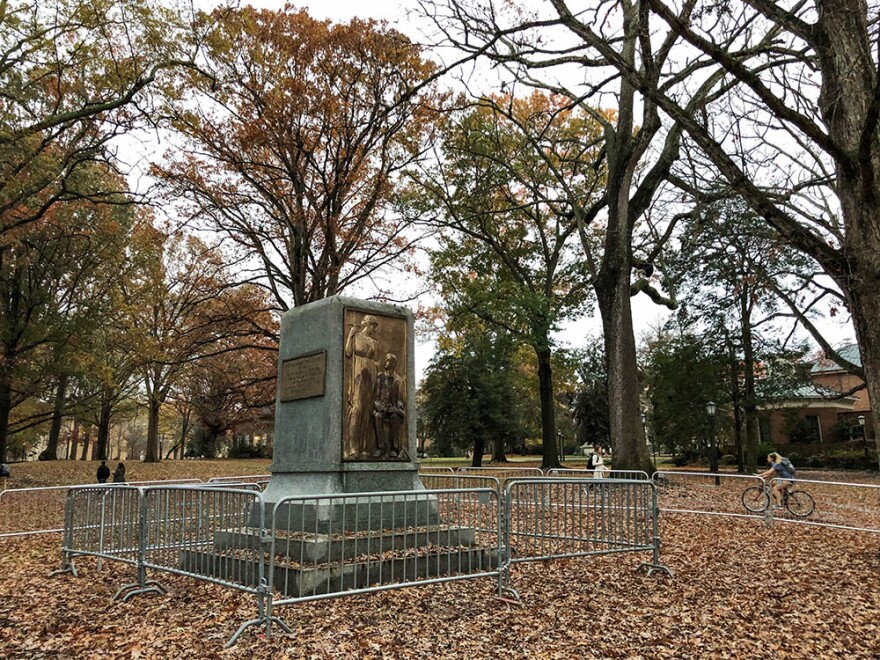A showdown is mounting between UNC- Chapel Hill officials and some university faculty and graduate students over the fate of Silent Sam.More than 80 teaching assistants and professors have pledged to withhold final grades. They demand university trustees withdraw their proposal for a new $5 million history center to house the Confederate statue. TAs in particular are putting a lot on the line, because of their dual roles as students and workers.
Members of the UNC system’s Board of Governors are set to vote on the trustees’ proposal for Silent Sam tomorrow.
University administrators have told TAs that withholding grades will result in "serious consequences.” They have alleged the strike exposes the university to legal claims from students who may be harmed.
“I think that effective protest is uncomfortable,” said Erika Wilson, a law professor at UNC. “We didn’t get to where we are today, now, with me being an African-American law professor at UNC, with African-American students being integrated into the university, without protest that was uncomfortable.”

Wilson said it’s interesting that university leaders have highlighted the harm the protest might cause students.
“While at the same time minimizing or failing to acknowledge the harm that’s being perpetuated by the existence of the monument in the first place, the refusal to take it down, and the decision to re-erect it,” she said.
Silent Sam was originally put up in 1913 at the entrance to UNC as Jim Crow laws took hold in the South. It was dedicated with a speech praising the nearby assault of a black woman.
“This was a statue that was put in place to say people and students who look like me are not welcome at this university,” said Destiny Green, an undergraduate at UNC.
Green is set to graduate this Sunday. University officials have said the grade strike will harm students like her. But Green is supporting it anyway. She says TAs plan to submit her grades and the grades of other students who need them for graduation, for jobs, or for immigration purposes.
“Our TAs aren’t trying to harm students,” Green said. “They’re our teachers, they’re our educators, they care about us.”

Danielle Dulken is a PhD student in the American Studies Department at the university and is helping organize the strike. She says TAs often have closer teaching relationships to students than faculty.
“What’s been really upsetting is how the university has sort of weaponized our motive as something that doesn’t take into consideration students,” Dulken said. “When, in fact, we’re deeply, deeply invested in the care of students.”
[TAs] have one foot in each of the worlds, so that they have the vulnerabilities that goes with that. They are susceptible to retaliation as students... as well as retaliation in their role as workers. But it also means that they have the power that students have and the power that workers have. -Angus Johnston
UNC administrators declined WUNC’s requests for an interview about the grade strike. In an email, a spokesperson for the university said officials are unable to discuss consequences for participating TAs, citing federal privacy laws.
Angus Johnston is a historian of student activism at the City University of New York. He says the grade strike is a tactic he hasn't seen before, and he believes the consequences for the TAs who take part could be two-fold.
“They have one foot in each of the worlds, so that they have the vulnerabilities that goes with that,” Johnston said. “They are susceptible to retaliation as students, losing fellowships or even losing their place in the university if they get punished in that way. As well as retaliation in their role as workers. But it also means that they have the power that students have and the power that workers have.”
More than 200 UNC faculty members have signed a letter condemning any retaliation -- including expulsion, elimination of teaching positions, and withdrawal of scholarships or stipends -- against TAs who strike.
Huong-An Truong’s name is one of the 200-plus on the letter. She’s an associate professor in the UNC Art Department.
“The graduate students have been incredibly brave and courageous, and I feel like the faculty have taken their cue from them,” Truong said. “I think the faculty are stepping up because we see the graduate students taking risks -- incredible risks to their own lives, their own education.”
In the meantime, the grade strike is gaining traction. Hundreds of undergraduates, student athletes and university faculty across the country have publicly expressed their support. And thousands of dollars have been raised for TAs who face repercussions for withholding grades.







